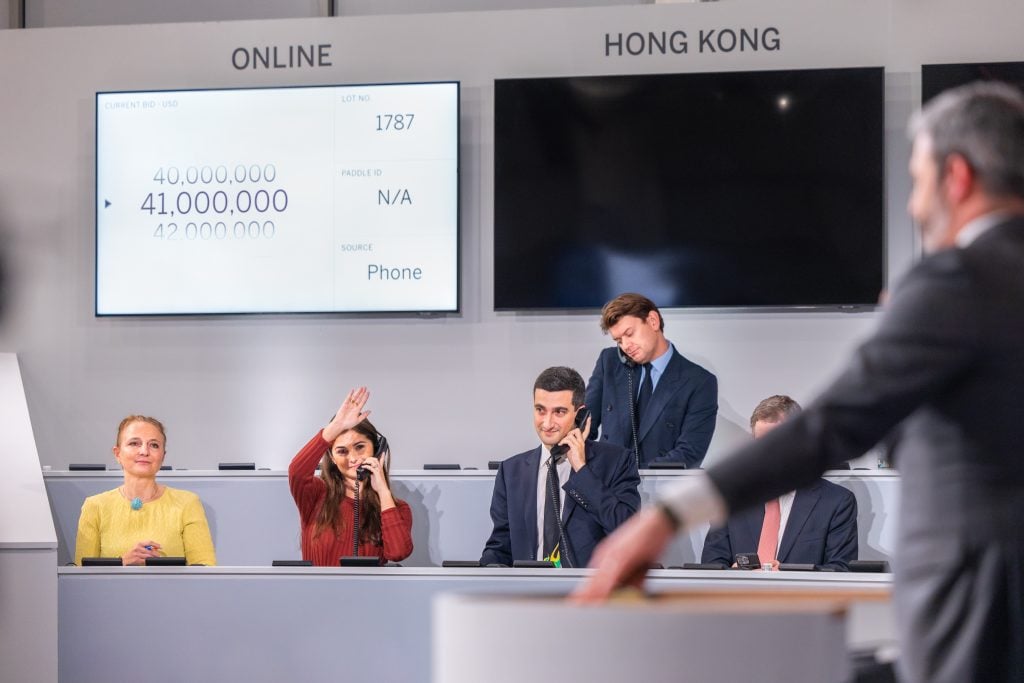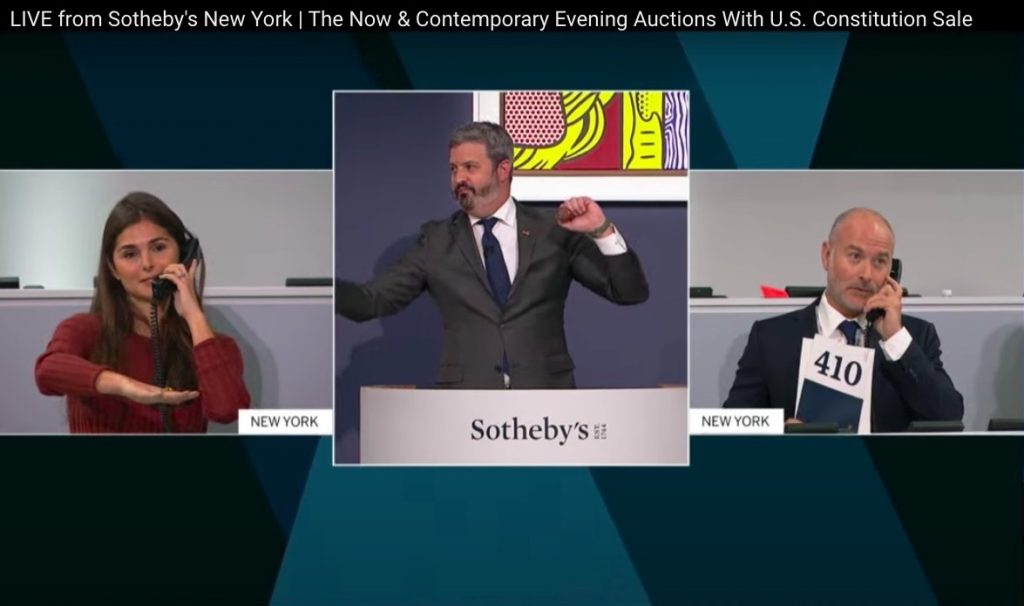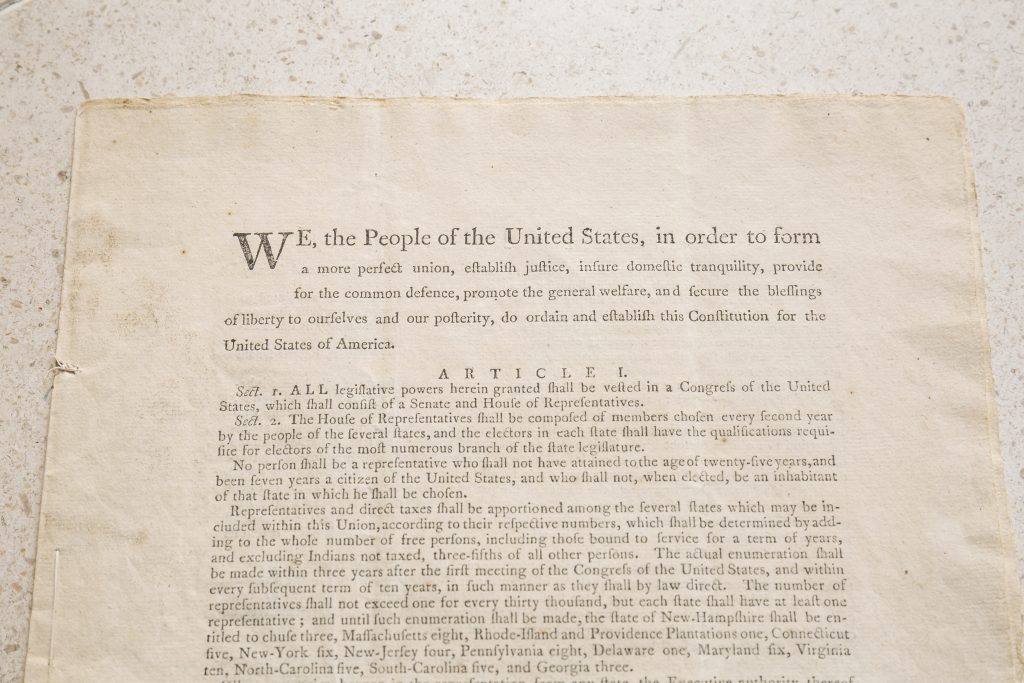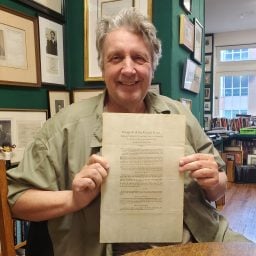One of only two privately owned first printings of the U.S. Constitution sold at Sotheby’s New York on Thursday evening for $43.2 million, becoming the most expensive book, manuscript, historical document, or printed text ever to hit the auction block.
The winning bidder, who remains anonymous, defeated ConstitutionDAO, a group of cryptocurrency enthusiasts who banded together over a matter of days to fundraise on the blockchain to purchase the document and put it on public display, “for the people.”
When Sotheby’s announced in September that it would offer a copy of the nation’s foundational legal text, everyone assumed that the most unusual thing about the sale would be its inclusion in the house’s marquee contemporary art evening auction. Instead, headlines all centered around ConstitutionDAO’s efforts, which saw the group raise a total of $46 million—the largest crowdfunding initiative of all time.
The final price beats out an auction record that stood for 27 years, when Bill Gates purchased the Codex Leicester by Leonardo da Vinci at Christie’s in 1994 for $30.8 million. The copy of the U.S. constitution on offer was owned by the late S. Howard Goldman, a real estate developer and collector of historic documents. Proceeds from the auction will benefit the Dorothy Tapper Goldman Foundation, founded by his wife to promote public understanding of democracy.

Sotheby’s chairman Brooke Lampley on the phone for the winning bid of the Constitution at Sotheby’s New York. Photo courtesy of Sotheby’s New York.
During the sale, contributors to the DAO and spectators alike were communicating rapid-fire on private Discord channels and Sotheby’s livestream chat. As phone bidders represented by Brooke Lampley, Sotheby’s chairman and worldwide head of fine-art sales, and David Schrader, Sotheby’s head of private sales, went head to head, confusion abounded over who was actually representing the DAO. (“Are we Brooke??” was a common refrain.)
The bidding battle took eight minutes. In the end, Lampley won the lot, and it took about 20 minutes for word to trickle down to DAO contributors that she was not, in fact, representing them. (Initially, ConstitutionDAO organizers announced that they had won the auction in an exuberant Twitter livestream.)
Asked why the DAO stopped bidding at a hammer price of $40 million, a representative for ConstitutionDAO explained in a Discord chat that the group had factored in the costs to insure, store, and transport the document safely.
“We calculated the absolute max we could go to while still meeting these requirements,” the representative said. “The opposing bidder passed that max, and we were unable to go any higher while still ensuring that we could properly care for the document.”
The plan to buy the constitution as a DAO was the brainchild of Graham Novak, a 25-year-old venture capitalist, and Austin Cain, a 25-year-old financial advisor, who saw the idea quickly snowball after sharing it on Twitter just one week ago. Fundraising only began on Monday.
The “DAO” in ConstitutionDAO is short for decentralized autonomous organization, a type of community-run business that operates on the blockchain and does not have a central governing body.
“Basically, a small group of people come together to form a chat group, and then they decide to pull capital together, [typically] using an Ethereum wallet,” Cooper Turley, another core ConstitutionDAO member, told CNBC.
The frenzy for ConstitutionDAO follows on the heels of similarly populist efforts to drive up the prices for GameStop and stock for other struggling companies such as AMC and Blackberry—made possible by the Robinhood Trading app.
The precise legal status of DAOs, and how they might be regulated, is unclear. While the DAO successfully registered to bid, Sotheby’s told the BBC ahead of the sale that it had to take “certain legal steps” to ensure it could participate as “DAOs are not legally recognized entities in most jurisdictions.”
Applying the DAO model to ownership of a physical item has proven somewhat tricky (though it has been done before—PleasrDAO was the buyer of Martin Shkreli’s one-of-a-kind Wu-Tang album).
“It’s a document,” core organizer Brian Wagner told the Wall Street Journal. “A lot of the complexity is related to the fact that it’s not on the blockchain.”
Contributors to the ConstitutionDAO received a governance token called $PEOPLE, a cryptocurrency specific to the project, priced at a rate of 1,000,000 $PEOPLE for each ETH (roughly $4,600) donated. The tokens would give the holder input as to what the group would ultimately do with the document.

Screenshot of the Sotheby’s sale of the U.S. Constitution.
In the end, according to a statement from the DAO, 17,437 donors contributed with a median donation size of $206.26. “A significant portion” of those were first-time crypto users, though investors are also said to include cryptocurrency exchange Gemini. Metaversal, an NFT investment firm, released a press releasing claiming it was ConstitutionDAO’s largest public contributor.
“We have educated an entire cohort of people around the world—from museum curators and art directors to our grandmothers asking us what ETH is,” the DAO said in a statement. “And, on the flip side, many of you have learned about what it means to steward an asset like the U.S. Constitution across museums and collections, or watched an art auction for the first time.”
The late S. Howard Goldman purchased the copy of the constitution for just $165,000 at Sotheby’s in 1988. That was the only other time that one of the first editions had ever come to auction, according to Sotheby’s. Only a member of the Continental Congress or a delegate to the Continental Convention would have had access to this first printing, the house said.

The official edition of the Constitution, the first printing of its final text. Photo courtesy of Sotheby’s New York.
The copy comes in a half blue morocco folding-case, the inside cover of which bears the signatures of numerous 20th-century political figures, including former presidents Jimmy Carter and Bill Clinton, former Congressman John Lewis, and numerous Supreme Court justices. The document’s first printing did not feature any signatures from the founding fathers.
In the wake of the sale, conversation among the ConstitutionDAO participants on the Twitter livestream centered on whether it had been a mistake to publicly display how much money had been raised, thereby giving rival bidders an idea of their war chest. (After the fundraising effort went viral and blew past its initial $20 million goal, the total raised had been hidden in the final day—though it was still publicly accessible to those who knew how to look.)
Now that their effort has failed, the DAO members will vote on what to do with the money. Possibilities including issuing refunds, bidding on a different historical artifact, or donating the money to charity. But unraveling this grand experiment may be complicated. The fees required to withdraw from the DAO may not be worth it for many investors.
“DAO’s are so new that this refund procedure is going to be a real learning curve,” one participant said on a Twitter Spaces conversation following the sale. “It’s not going to be as seamless as people think.”












